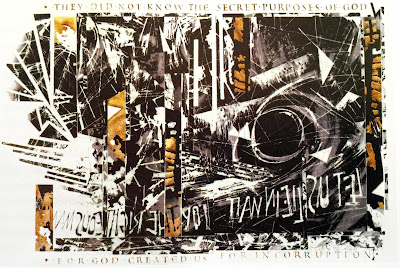Something strange is happening – a second century homily on Holy Saturday begins with this reflection, both vague and definite. It is unlike any other day because it lacks a precise meaning. After the funeral party has gone home and the dishes are cleared there is a large silence and a boundless emptiness. The old language of relationship has dissolved and the new one has yet to take shape.
In between two ways of knowing, we only know clearly that we don’t know. Through unknowing, as through a break in the clouds or a crack in a curtain, a kind of light not seen before promises to emerge. But it is not certain. Nothing is for sure any more.
In these times of living on the edge of two worlds we have only the light of faith, pure consciousness itself. Death is still being digested; the work of Resurrection has begun.
A prayer from Walter Brueggemann:
Holy God who hovers daily round us in fidelity and compassion,
this day we are mindful of another, dread-filled hovering,
that of the power of death before which we stand
thin and needful.
All our days, we are mindful of the pieces of our lives
and the parts of your world
that are on the loose in destructive ways.
We notice that wildness midst our fear and our anger unresolved.
We mark it in a world of brutality and poverty and hunger
all around us.
We notice all our days.
Born on this day of all days,
that great threat looms so large and powerful.
It is not for nothing
that we tremble at these three hours of darkness
and the raging earthquake.
It is not for nothing
that we have a sense of our helplessness
before the dread power of death that has broken loose
and that struts against our interest and even against our will.
Our whole life is not unlike the playground in the village,
lovely and delightful and filled with squeals unafraid,
and then we remember the silencing
of all those squeals in death,
and we remember the legions
that are swept away in a riddle too deep for knowing.
Our whole life is like that playground
and on this dread-filled Friday we pause before
the terrible silencing we cannot master.
So we come in our helpless candor this day...
remembering, giving thanks, celebrating...
but not for one instant unmindful of the dangers too ominous
and powers too sturdy and threats well beyond us.
We turn eventually from our hurt for children lost.
We turn finally from all of our unresolved losses
to the cosmic grief at the loss of Jesus.
We recall and relive that wrenching Friday
when the hurt cut to your heart.
We see in that terrible hurt, our losses
and your full embrace of loss and defeat.
We dare pray while the darkness descends
and the earthquake trembles,
we dare pray for eyes to see fully
and mouths to speak fully the power of death all around,
we dare pray for a capacity to notice unflinching
that in our happy playgrounds other children die,
and grow silent,
we pray more for your notice and your promise
and your healing.
Our only urging on Friday is that you live this as we must
impacted but not destroyed,
dimmed but not quenched.
For your great staying power
and your promise of newness we praise you.
It is in your power
and your promise that we take our stand this day.
We dare trust that Friday is never the last day,
so we watch for the new day of life.
Hear our prayer and be your full self toward us.
Amen.














